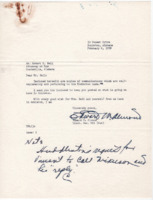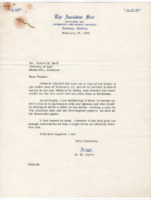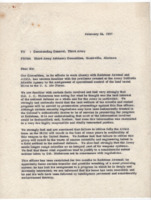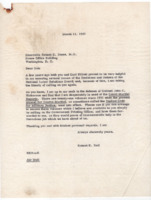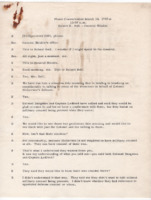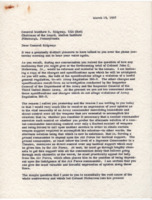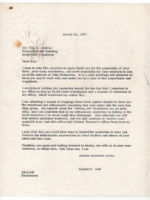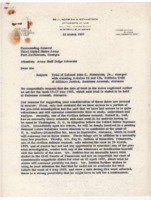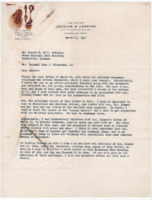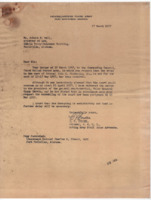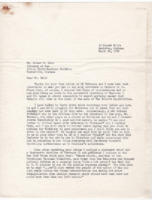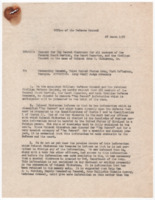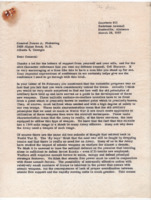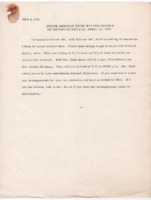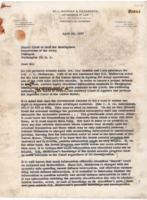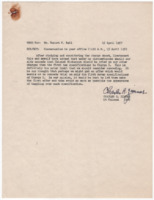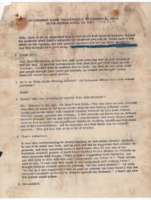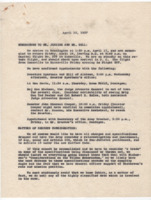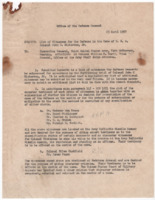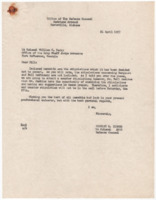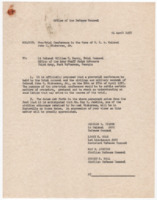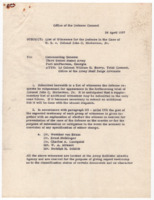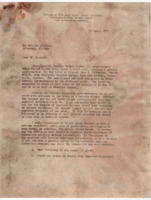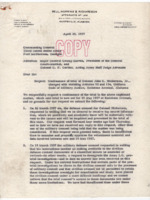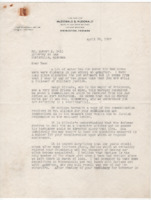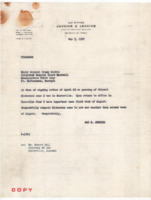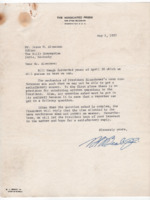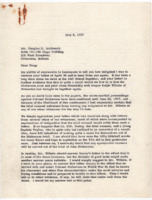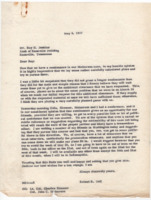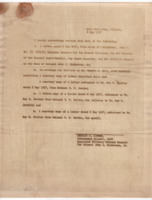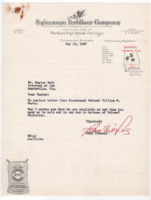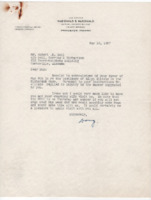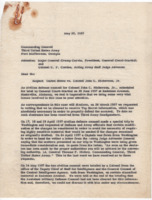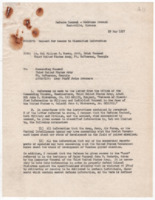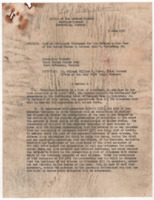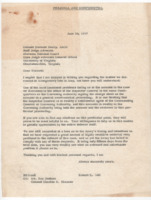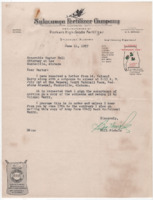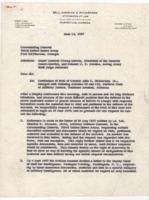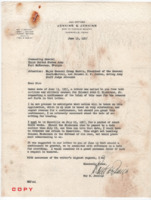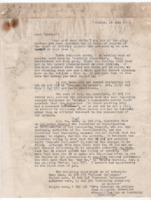
Browse Items (207 total)
Sort by:
-
Correspondence between Robert K. Bell and Edward M. Almond.
These letters include information pertaining to the Nickerson case. Almond expresses desire to "get something in motion to subdue the unnecessary and trivial expressions of � General Medaris". The letters also mention various correspondence that was included in the exchange of information. Both men advocate for the "cause" of Colonel Nickerson's actions. Bell was Nickerson's attorney during his trial. -
Correspondence between Robert K. Bell and Harry M. Ayers.
In response to Bell's February 13 letter from Edward Almond, Ayers informs Bell that he is attempting to find someone who would write a letter to newspaper publications in agreement with their opinion that Medaris is taking too much credit for his work. Bell responds that he is skeptical Ayers would find anyone as Medaris could make their life a "rather miserable existence". -
Letter to the Commanding General, Third Army, from the Third Army Advisory Committee.
This letter details the committee's agreement with Nickerson's actions, believing he was acting "for what he thought was the best interest of the national defense." They advocate for the inclusion of the Army Ballistic Missile Agency team on the intermediate-range ballistic missile program. The committee states that trial by court-martial would not reflect the many accomplishments Nickerson has made for the Army weapon program and feel it unnecessary. -
Letter to Robert E. Jones from Robert K. Bell.
Robert K. Bell writes to Senator Bob Jones for help and information regarding the Nickerson case. -
Phone conversation between Robert K. Bell and General Shinkle
The transcript details a conversation regarding the necessity of military counsel being present during the conference with Colonel Bengston, Captain Ledford, and Colonel Nickerson and under whose orders was the military counsel under. -
Letter to General Matthew B. Ridgway from Lt. Colonel Charles R. Zimmer.
These documents include the draft of the letter and the final letter. Zimmer writes to Ridgway regarding his testimony and its importance in the Nickerson trial. Zimmer also asks for Ridgway's opinion on the "necessity of an Army commander exercising immediate and direct control" over defense weapons. -
Letter to Ray H. Jenkins from Robert K. Bell.
Bell thanks Jenkins for joining the defense of Nickerson and writes that he included newspaper clippings and other informative information about the case. -
Letter to the Commanding General, Third Army.
In this letter, it is requested that May 13-17, 1957 be set as the dates of the Nickerson trial. It then details the reasons for these specific dates. -
Letter to Robert K. Bell from Ray H. Jenkins.
Jenkins writes in response to Bell's March 22 letter, addressing the various information that was included in Bell's letter and his ability to visit Huntsville for nine days to help prepare for the trial. -
Letter to Robert K. Bell from C. F. Cordes.
Cordes writes in response to the defense counsel's request to the Commanding General, Third United States Army, of the trials dates May 13-17, 1957. He confirms that the trials dates have been postponed to the 15th in accordance with their request. -
Letter to Robert K. Bell from Edward M. Almond.
Almond writes in reponse to Bell's February 18 letter regarding Medaris and other information of the Nickerson case. -
Letter to the Commanding General, Third United States Army from the Defense Counsel.
The Defense Counsel writes to the Commanding General, Third United States Army requesting "top secret clearance for all members of the General Court Martial, the Court Reporter, and the Civilian Counsel n the case of Colonel John C. Nickerson, Jr." -
Letter to James A. Pickering from John "Jack" Nickerson.
Nickerson thanks Pickering for the letters of support sent to his defense counsel. He also discusses ballistic surface-to-surface missiles and "scientific progress". He ends by requesting a deposition as Pickering will be in Europe in May, when the trial is scheduled to happen. -
Phone message to Robert K. Bell from Walter Harper.
In this transcript of the phone message to Bell from Walter Harper of Reynolds Metals, Bell is informed that Mr. Hunt will be arriving the following day and will try to land at the air strip at Redstone Arsenal. This information was asked to be passed on to Colonel Nickerson. -
Letter and drafts of letter to the Deputy Chief of Staff for Intelligence from Robert K. Bell.
These drafts of the letter and final letter to the Deputy Chief of Staff for Intelligence requesting highly classified information to be made available to the Court in order to "insure a proper defense" in the Nickerson case. These documents also include a letter from Bell to Ray H. Jenkins asking him to read the draft of the letter before Bell sends it and also asks about traveling to Washington the following week. -
Memorandum for Robert K. Bell from Charles R. Zimmer.
This memo was written about a conversation earlier that day. Zimmer tells Bell that after discussing with Lieutenant Cole, they agree that Colonel Nickerson should not be tried on any other charges than the first ten specification to Charge I. -
Statements of Mrs. Nickerson and Dr. Wernher von Braun.
These voluntary statements were made in the office of Robert K. Bell. The first by Mrs. John C. Nickerson and the second by Dr. Wernher von Braun. -
Memorandum for Ray H. Jenkins and Robert K. Bell
This memo details an upcoming trip to Washington and the scheduled appointments with various senators and military officials in regard to the Nickerson case. The memo states that it would be preferred is all charges and specifications dropped and consider a reinvestigation and punishment. It includes other information regarding the case. -
Witness list as submitted to the Comannding General, Third United States Army.
In this letter, the Defense Counsel provides a list of witnesses for the defense in the case of John Nickerson. -
Letter to William G. Barry from Charles R. Zimmer.
Zimmer writes to Lt. Colonel Willaim G. Barry with the stipulations that will not be accepted in the case of Colonel John C. Nickerson. -
Letter to William G. Barry from the Defense Counsel.
This letter requests a pre-trial conference be held on the 26th or 27th of April, 1957. -
Witness list as submitted to the Comannding General, Third United States Army.
In this letter, the Defense Counsel provides a list of witnesses for the defense in the case of John Nickerson. -
Letter to William Nichols from William G. Barry.
This letter requests William Nichols to be present at the trial as a defense witness and a written statement from Nichols to detail what his testimony would be. The letter includes questions for Nichols to answer in the written statement. -
Letter to the Commanding General, Third United States Army from the Defense Counsel.
This letter from the Defense Counsel requests a continuance of the trial of Colonel John C. Nickerson due to the counsel still waiting on a response to their request for top secret clearance for access to pertinent information for the trial and the delay of the release of the pre-trial investigation to the civilian defense counsel. A letter from John Nickerson follows, detailing how without top secret clearance, he is unable to provide his civilian counsel with "essential components of the real issues in my defense without divulging information that is now classified." Multiple copies are included. -
Letter to Robert K. Bell from Douglas H. McDonald.
McDonald expresses interest in John C. Nickerson's case to Bell in this letter. He explains that he heard about the case from a friend, Ralph Wiltsie, who served under Colonel Nickerson during World War II. McDonald writes that Wiltsie is under the impression that the counsel will want to call him as a trial witness. -
Telegram to Major General Crump Garrin from Ray H. Jenkins.
Jenkins requests the trial of Colonel Nickerson to be scheduled no earlier than the second week of August due to an important case he has the first week of August. -
Letter to Jesse M. Alverson from W. L. Beale, Jr.
Beale writes to Alverson, the editor of The Daily Enterprise, regarding potential questions Alverson wants to ask President Eisenhower. -
Letter to Douglas H. McDonald from Robert K. Bell.
Bell responds to McDonald's letter from April 30, 1957. He discusses the Nickerson case and the recent call for witnesses by the trial counsel. He also discusses old aquaintances on a personal level and mentions his upcoming trip to Indianapolis, hoping to have lunch with McDonald while there. -
Letter to Ray H. Jenkins from Robert K. Bell.
After receiving a continuance in the Nickerson case, Bell writes to Jenkins about making new plans. He states that they are going to try to get any political assistance that they can and that he will be writing to a number of friends in Washington regarding the case. -
Acknowledgment of receipt of documents from John C. Nickerson, Jr. to Charles R. Zimmer.
This letter acknowledges the receipt of a letter, an envelope for delivery, two courtesty copies, and a carbon copy of various letters. -
Correspondence from William Nichols to Robert K. Bell containing a letter from William G. Barry.
William Nichols writes to Robert K. Bell, enclosing a letter from Lieutenant Colonel William G. Barry. The enclosed letter requests William Nichols' presence at the Nickerson trial at an undetermined date. It states that a subpoena will be sent when a date is set. -
Letter from Douglas H. McDonald to Robert K. Bell.
In response to Bell's May 8th letter, McDonald informs Bell that Mr. Wiltsie will proceed as instructed regarding the reponse to the inquiry. He also expresses that he and his wife are excited to have Bell and his wife visit them. -
Letter and draft of letter to Crump Garvin and C. F. Cordes from Robert K. Bell.
In this letter, Bell explains that the defense counsel still has not received approval for top secret security clearance, necessary to "properly defend the accused." Bell states that while the defense counsel would prefer not to request a delay of the proceedings, if the clearance is not granted, they may have no choice but to do so. The documents also include the original draft of the letter. -
Defense counsel's request for access to classified information.
This letter outlines the defense counsel's request for access to flassified information in reference to a previous letter received from the Office of the Commanding General, Third United States Army. -
List of additional witnesses for the defense of Colonel John C. Nickerson, Jr.
This submitted list of additional witness was in addition to the list submitted on April 25, 1957. -
Letter to Walter Emmett Perry from Robert K. Bell.
The defense counsel believes that the Commanding General or Convening Authority is both the accuser and the reviewer in the proceeding. Bell asks Perry in this letter for any "citations" on that particular point. -
Letter to Robert K. Bell from William Nichols.
Nichols writes to Bell to inform him of the supoena he received to appear in court on July 2nd. He states that he will proceed as requested unless he hears from Bell with other instructions. -
Letter to the Commanding General, Third United States Army, from the defense counsel.
The Defense Counsel writes to the Commanding General, Third United States Army, requesting a continuance of trial of Colonel John C. Nickerson, Jr., citing the failure of the government to approve their request for top secret clearance as the reason. The defense counsel details how the clearance is vital to Nickerson's defense. -
Letter to the Commanding General, Third United States Army, from Ray H. Jenkins.
Jenkins writes to Major General Crump Gavin citing his personal reasons why the Commanding General should approve the defense counsel's request for a continuance. -
Letter to Robert "Buster" Bell from Walter Emmett Perry.
Perry responds to Bell's letter of June 10th regarding the possible accuser also being the reviewer in the Nickerson trial proceedings.
